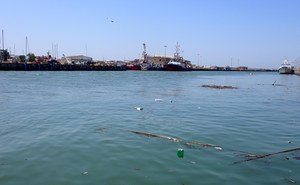Riverine floating macrolitter: the ISPRA national monitoring program for the Marine Strategy
On the occasion of World Rivers Day on 22 September 2024, ISPRA publishes the booklet Riverine floating macrolitter: the Italian national monitoring programme within the Marine Strategy carried out as part of the Operational Agreement for monitoring programs for the Marine Strategy between MASE and ISPRA.
The result of a year of monitoring in 12 rivers, in the three marine sub-regions, for a total of approximately 400 hours, and carried out in collaboration with the Sustainable Development Foundation, highlighted how the Tiber, Sarno and Po are, among the rivers investigated, those that convey more macro-litter floating into the sea.
The passage of the watercourse in densely populated centers compared to rural areas and the flow of the river are associated with a greater number of waste in the river. More than 80% is made up of plastic and of this more than 1/3 is disposable; There is also numerous packaging linked to food consumption.
To investigate the dynamics of waste in rivers, floating containers, designed to simulate the behavior of macro-waste, were released into the waterways, with GPS trackers. The results highlighted both the long permanence of the objects in the rivers, with a "stop & go" behavior in relation to the flow rates, and the ability to travel long distances once in the sea. Waste from the Po river reached Puglia and from the Tiber and Ombrone they reached France (Corsica and the French Riviera).
The information in the booklet will also be useful for the purposes of the “Salvamare” law (L. 17 May 2022, n. 60) art. 6 (Measures for the collection of floating waste in rivers) and its related decree (DD 525/2023). On the Tiber River, for example, the waste collection barrier was presumably able to stop one of the ten containers with trackers, blocking it before it reached the sea.
Even with SNPA support, monitoring will continue into the future.

